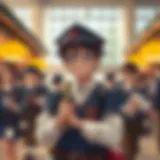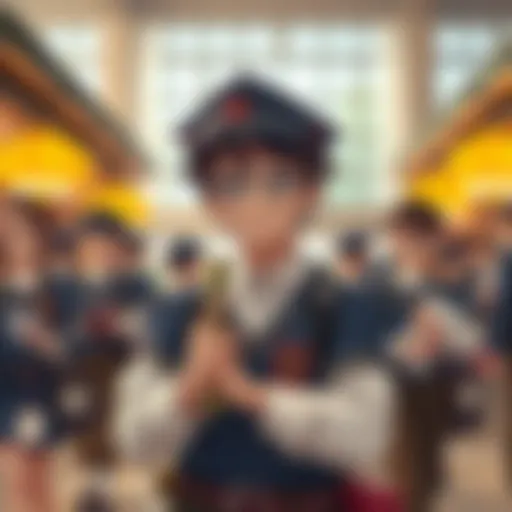Witch Hunters in Anime: Cultural Reflections and Morality
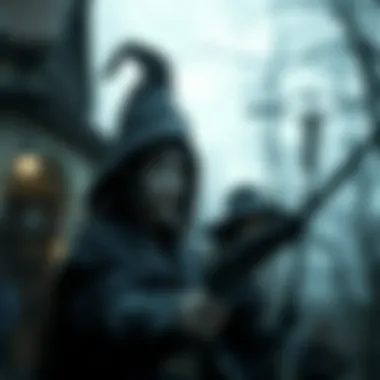

Intro
In the sprawling landscape of anime culture, character archetypes arise and take on lives of their own, contributing to the depth of storytelling. Among the most fascinating is the figure of the witch hunter, a character often steeped in moral ambiguity and societal reflection. These characters are not merely instruments of justice; they grapple with the rays of righteousness and the shadows of their choices. From classic tales to modern interpretations, the portrayal of witch hunters reveals much about the zeitgeist of the times.
By dissecting their role, we uncover how they act as reflections of broader themes such as justice, morality, and the supernatural. Characters like Kyuubey from Puella Magi Madoka Magica or Archer from Fate/stay night serve as conduits through which viewers can parse the complexities of human nature and belief systems. These narratives often align with historical witch hunts, drawing parallels that prompt us to question who bears the true mantle of justice.
This exploration doesn’t just stay on the surface. It unravels a plethora of motifs embedded within anime. Notably, the thematic elements tied to witch hunts speak to societal fears, the struggle for control, and an intrinsic human desire to confront the unknown. Characters portrayed as hunters often reflect the duplicity of morality—are they saviors or executioners in their quest?
In this article, we will dissect these representations while offering insights into how they shape viewer engagement. Expect detailed examples that illuminate both historical contexts and the artistic choices that define these characters. Through a careful analysis, we aim to provide a fresh lens on how witch hunters operate within the anime narrative paradigm, ultimately stimulating thoughtful discourse among fans and scholars alike.
Intro to Witch Hunters
The realm of anime is vast and multifaceted, weaving together narratives that reflect cultural, ethical, and social quandaries. One of the recurring motifs within this space is the figure of the witch hunter. These characters are not mere antagonists; they often embody deeper themes of morality and justice, making them pivotal to story arcs that challenge viewers' perceptions.
Witch hunters serve as agents of societal norms, enforcing beliefs that can both protect and oppress. The importance of engaging with the witch hunter archetype is multifaceted. It invites us to consider how society defines good and evil and what happens when those definitions become entangled with fear, power, and belief.
Definition and Historical Context
To understand witch hunters in anime, we must first define who they are. Generally, witch hunters are portrayed as individuals or groups dedicated to seeking out and eliminating those who are believed to practice witchcraft. Historically, the witch hunting phenomenon gained prominence during certain periods, such as the European witch trials of the 16th to 18th centuries. These events were driven by a cocktail of superstition, religion, and cultural paranoia. In anime, this historical backdrop often serves as a canvas, illustrating how past persecution continues to influence the present.
As characters, witch hunters are often portrayed as rigid, driven by a fanatical zeal that sometimes puts them at odds with their own moral compass. This complexity adds a rich layer to storytelling, as viewers are invited to grapple with the implications of such fervent beliefs.
Cultural Significance in Anime
In anime, the cultural significance of witch hunters extends beyond their role as mere hunters. They often represent a society's desire for order amidst chaos, a reflection of collective fear of the unknown. Themes of control and the abuse of power frequently emerge through these characters, challenging the audience to consider the price of safety and righteousness.
Moreover, the portrayal of witch hunters in anime can spark discussions about contemporary issues, such as intolerance and the vilification of marginalized groups. Through nuanced representations, creators compel viewers to reflect on their values, the ease of demonizing others, and the ramifications of societal hysteria.
"In the shadows of history, the burden of fear has often birthed monsters. Witch hunters are both guardians and executioners."
As we delve deeper into this topic across various subsections, we will see how witch hunters are not merely figures in narratives but lenses through which we can scrutinize our world, our beliefs, and the oft-tangled web of morality and justice in society.
Thematic Elements of Witch Hunting
The theme of witch hunting in anime is a deep well of narrative exploration, rich with possibilities that reflect societal fears, moral dilemmas, and otherworldly encounters. At the core of this theme is a profound interrogation of justice and morality, where characters navigate the murky waters of right and wrong. This section will dissect the principal thematic elements, providing insights into their relevance and significance within the anime genre.
Morality and Justice
Morality is often painted in shades of gray within anime involving witch hunters. Instead of a clear-cut battle between good and evil, viewers are presented with protagonists who wrestle with their beliefs, obligations, and often flawed systems that govern their actions. The intelligent dialogue surrounding morality in shows like The Fate Series presents viewers with ethical quandaries that echo real-world dilemmas, challenging them to question what justice means when it is pursued through violence.
In stories such as Akame ga Kill!, characters act as agents of justice, but often their methods lead to unintended consequences that raise questions about the righteousness of their cause.
"Justice must be served, but at what cost?"
This conflict engages the audience on a deeper level, compelling them to reflect on their own moral perspectives.
Supernatural Encounters
Supernatural elements are crucial in amplifying the themes of witch hunting in anime. Often, these figures are painted as monstrous threats, wielding powers that elicit both fear and fascination. Characters like Mikasa Ackerman from Attack on Titan embody this complex relationship with the supernatural; while she fights against what she perceives as evil, the audience recognizes the humanity often hidden beneath the surface.
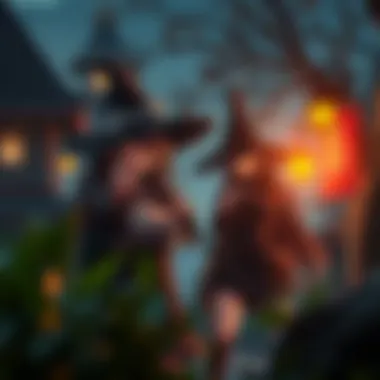

These encounters serve to heighten tension and drama but also act as metaphors for internal fears—be it the fear of the unknown or the fear of betrayal. This intertwining of the supernatural with human emotions generates a visceral experience, making the narratives not only thrilling but also relatable on a psychological level.
Fear and Control
Fear operates as a significant tool for control in narratives centered around witch hunting. Characters often leverage this fear to enforce authority, with powerful institutions using hysteria to justify their oppressive actions. In shows such as Paranoia Agent, the theme of fear is pervasive—exploiting public paranoia to demonstrate how entities manipulate societies for their benefit.
The portrayal of witch hunters, from soul-hunters to inquisitors, embodies this theme distinctly. They become the enforcers of an ideologically driven agenda, often drawing parallels to historical witch hunts that flourished during times of societal tension and fear. This thematic element prompts viewers to reconsider historical narratives and their implications on modern society.
By engaging with the multiple layers of morality, supernatural elements, and societal fears, anime delves into the complexities surrounding witch hunting, showcasing a blend of entertainment and thought-provoking content that resonates with audiences. Each element interweaves to illustrate more than just a story about witches; it calls on viewers to confront their own values and the constructs of justice in their worlds.
Notable Anime Featuring Witch Hunters
The presence of witch hunters in anime adds depth to the storytelling, offering viewers a unique blend of historical drama and fantastical elements. These characters often embody the complex nature of morality, justice, and the supernatural, serving as central figures who drive the narrative forward. Understanding notable anime in this category is crucial for comprehending how these themes manifest in various showcases of witch hunting, both in classic and contemporary settings.
Classic Representations
Historical Accuracy versus Artistic License
When examining the classic representations of witch hunters in anime, the tension between historical accuracy and artistic license emerges as a compelling aspect. Many shows take a few liberties with historical facts, weaving in fantastical elements and concocting narratives that don’t always align with the real-life witch hunts of the past. This divergence often enriches the story, allowing creators to explore themes of fear, oppression, and societal norms without the shackles of historical fidelity.
While some viewers may appreciate the creative license, others might critique the lack of authenticity. The choice to prioritize storytelling over strict adherence to history often results in plots that are more imaginative and engaging.
For instance, series like "Baccano!" exhibit this blend robustly, presenting a historical context while embellishing it with supernatural occurrences. Such choices enable the narrative to remain captivating and encourages audience engagement with the ethical struggles faced by characters.
Impact on Audience Perception
The impact of these classic representations of witch hunters on audience perception cannot be understated. These portrayals significantly shape how viewers perceive both the characters and the socio-political issues surrounding witch hunting. When audiences see characters like the relentless witch hunter embodying a misguided sense of justice, it prompts discussions on morality and ethics. Moreover, the artistic representation of such characters often serves to evoke a sympathy for those labeled as witches, challenging viewers to re-evaluate their beliefs about right and wrong. Shows like "The Witch Hunter Robin" encapsulate this dynamic, as the complexities of the characters force viewers to confront their biases, making the experience reflective rather than merely entertaining.
Contemporary Adaptations
Character Development
In contemporary adaptations, character development takes center stage, adding layers to witch hunter figures. Unlike their classic counterparts, modern narratives often explore the backstory, motivations, and psychological struggles of these hunters. This fosters deeper connections between the audience and the characters, leading to richer discussions about the implications of their actions. A prime example is the series "Fate/Zero," where characters like Kiritsugu Emiya grapple with tough choices that blur the lines between heroism and villainy. Such intricate character arcs invite viewers to assess the price of vengeance and justice in a world filled with moral gray areas.
Moral Ambiguities
Lastly, the exploration of moral ambiguities within contemporary witch hunting narratives reflects the complexities of modern society. Today’s stories often challenge traditional notions of good and evil, presenting witch hunters not merely as villains but as flawed individuals struggling with their beliefs. The portrayal of witch hunters as anti-heroes allows for rich storytelling that resonates with a diverse audience.
For example, in "Grimoire of Zero," the narrative explores the relationships between witches and hunters, facilitating a dialogue about prejudice and understanding. Such representations provoke thought, pushing viewers to engage with the moral complexities surrounding persecution, thereby extending the discourse beyond entertainment into the realm of societal critique.
Character Archetypes in Witch Hunting
The world of anime is rich with character archetypes, each serving a distinct purpose in storytelling. Witch hunting, as depicted in various anime narratives, introduces us to distinct character molds that deepen the emotional and thematic resonance of these tales. Understanding these archetypes not only enriches our viewing experience but also offers insights into the cultural narratives surrounding witch hunting. Each character represents different facets of human experience, from the relentless pursuit of justice to the complexities of moral ambiguity. Exploring these archetypes helps viewers comprehend the interplay between individual motivations and societal norms in witch hunting narratives.
The Relentless Pursuer
The Relentless Pursuer represents the embodiment of vengeance or justice, often exhibiting an unwavering determination to eradicate witches, seen as bringers of chaos. This character is frequently portrayed with a single-minded focus, often sacrificing personal relationships in the name of their crusade. An interesting aspect of such characters is their evolution; often, they begin with a clear-cut sense of right and wrong, only to face moral dilemmas that challenge their beliefs.
For instance, in the anime Witch Hunter Robin, the main character Robin acts as a relentless pursuer of witches, driven by her organization's mission. However, as she uncovers the truth about the witches' plight, her perspective shifts, illustrating the complexity of her journey. The archetype serves as a lens to explore themes such as fanaticism and the consequences of blind allegiance to a cause.
The Complex Anti-Hero
Next, we have the Complex Anti-Hero, a character who blurs the lines between good and evil, often possessing a dark backstory that informs their actions. This archetype raises profound questions about morality. The anti-hero might commit morally questionable acts in the name of what they believe is just, forcing viewers to confront their own values and assumptions.
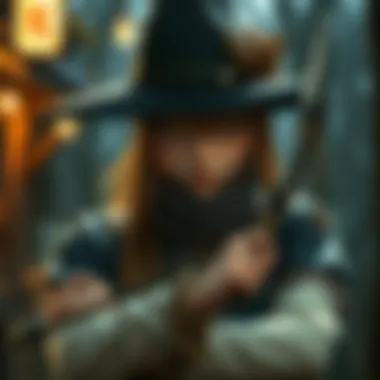

Take Fate/Zero, for example. Here, characters like Kiritsugu Emiya kill without remorse, believing that the ends justify the means. Their complexities bring depth to the narrative and provide a more nuanced understanding of witch hunting. Are they villains or victims of their circumstances? Such exploration reinforces the notion that the world is not merely black and white, but rather a convoluted tapestry of choices and consequences.
The Innocent Victim
Finally, the Innocent Victim archetype plays a pivotal role in witch hunting stories. Typically, this character is a misunderstood or wrongly accused individual, often subjected to harsh treatment by those in power. Their plight highlights themes of injustice, societal prejudice, and the fragility of innocence.
In Puella Magi Madoka Magica, the character Sayaka Miki exemplifies this archetype. She grapples with the reality of her existence as a magical girl, ultimately facing dire consequences for her wishes. Her victimization serves as a critique of the systems that commodify and exploit the vulnerable. The presence of such characters invites viewers to reflect on real-world issues of scapegoating and the moral implications of witch hunts in society.
"Through these archetypes, anime not only depicts the action-packed narratives of witch hunting but also interrogates the moral structures that underpin society."
In summary, exploring these archetypes adds layers of meaning to witch hunting narratives in anime, allowing audiences to question not just the actions of characters but the society they inhabit. As we move forward in the article, we will delve into how these portrayals resonate with historical and modern contexts, enriching our understanding of witch hunters in anime.
Societal Reflections in Witch Hunting Narratives
The representations of witch hunters in anime not only serve as thrilling plots but also act as mirrors reflecting broader societal issues. These narratives provoke discussions around morality, justice, and the human condition, all while depicting the historical trauma and cultural fears associated with witch hunts. Understanding societal reflections within these narratives helps audiences decode the complexities of the modern world through the lens of a vividly crafted imaginary realm.
Historical Parallels
Looking back, witch hunts were not merely instances of paranoia but critical societal events that revealed darker aspects of human nature and societal structures. In many anime, these histories reemerge as cautionary tales, prompting viewers to ponder about their own society. For instance, series like Fate/Zero showcase a backdrop rich in historical allegories, linking themes of persecution with the personal quests of its characters.
The past reminds us of how easily speculation can lead to scapegoating. This idea resonates in the narrative styles of various series that depict witch hunters with conflicting moralities, showcasing them as both heroes and villains. It illustrates how through the annals of time, the hunt has often been less about true justice and more about social control and fear-mongering.
- Symbolism of the Witch Hunt: The witch represents the
Viewer Reception and Cultural Impact
When diving into the world of anime, one striking element that captures viewers’ attention is the portrayal of witch hunters. These characters aren't just fictional constructs; they resonate deeply within cultural contexts, eliciting strong audience reactions that influence how stories develop and are received. The exploration of viewer reception unveils the powerful impact and significance of these characters on anime culture, making this section a key focus for understanding the broader implications of witch hunting narratives.
Audience Interpretations
When fans engage with anime featuring witch hunters, their interpretations are often shaped by their personal experiences, cultural backgrounds, and the societal narratives prevalent at the time. This infusion of individual perspective creates a rich tapestry of meanings that can diverge significantly from one viewer to another.
- Moral Complexity
Many viewers are drawn to the moral ambiguities embodied by witch hunters. It raises questions such as, "Are witch hunters heroes or villains?" For instance, in the anime "Witch Hunter Robin," the titular character grapples with the ethics of her duties. Fans often find themselves rooting for or against her, depending on their understanding of justice and morality. - Relatable Struggles
The internal conflicts faced by witch hunters often strike a chord with audiences. A character like Kirika Yuumura from "Noir" embodies the struggle with self-identity and the burdens of their roles. Many viewers can relate their personal struggles to these narratives, leading to a deep emotional connection.
"Anime often reflects our fears and desires. Witch hunters symbolize the fight against the unknown, mirroring the battles we face in our own lives."
Influence on Popular Culture
The presence of witch hunters in anime has left an indelible mark on popular culture, transcending the screen to influence various forms of media and artistic expression. This influence can be observed in several ways:
- Intertextual References
Other media forms, including films, video games, and even literature, frequently draw on witch hunting themes. For instance, in the acclaimed Dark Souls video game series, motifs related to witch hunting, such as persecution and redemption, play a pivotal role in the narrative. - Fashion and Aesthetics
The portrayal of witch hunters has even trickled into fashion, with gothic and occult elements inspired by their depiction in anime becoming trendy among fans. Street fashion often mirrors the styles of characters, allowing a connection between the stories portrayed and real-world expressions. - Fandom Engagement
The dedicated anime fandom has contributed to the popularity of witch hunters through fan art, discussions on platforms like Reddit, and cosplay events. These activities not only show appreciation for the characters but also help in creating an ongoing dialogue around the themes they represent.
Comparison with Other Genres
To fully appreciate the role of witch hunters in anime, it's essential to consider how this trope intertwines with various genres. The exploration of witch hunting extends beyond mere horror or fantasy, prompting a unique discourse within different narrative frameworks. By examining the crossover elements, we uncover the intricate ways in which these stories resonate across genres and reflect broader cultural contexts.
Fantasy Elements in Witch Hunting
At the heart of many anime featuring witch hunters lies a rich fantasy backdrop. Magic, mystical creatures, and alternate worlds are not just mere embellishments; they are the very fabric that shapes the narrative threads. The spellbinding allure of fantasy invites viewers to suspend disbelief and immerse themselves in a universe where the supernatural reigns supreme.
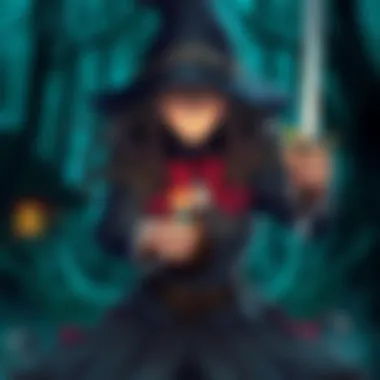

For instance, in shows like Fate/Zero, the conflict between witch hunters and various magical entities is steeped in a history that draws upon mythological references. The concept of witches is often exaggerated, blending folklore with creative storytelling. This magnifies the stakes—good versus evil, hero versus villain—while offering audiences the thrill of adventure.
Moreover, extraordinary abilities grant characters a certain level of agency, propelling them into battles that elevate the dramatic tension. Fighting against malicious witches becomes a poignant metaphor for humanity’s own struggles—something everyone can relate to, even if it’s set against a fantastical backdrop. The emotional depth grows when these encounters lead to moral dilemmas, making viewers ponder what it means to truly be 'good' or 'evil.'
"Fantasy allows us not only to believe in witches but to understand the very essence of conflict and power within our own societies."
Cross-Genre Influences
Witch hunting narratives do not exist in a vacuum. They often absorb elements from thrillers, dramas, and even slice-of-life genres. This cross-pollination offers a richer palette for storytelling. For example, take Akame ga Kill! where the witch hunters grapple not only with supernatural foes but also the harsh realities of political strife and moral corruption.
The blend of genres enhances character development, with witch hunters morphing into complex figures rather than one-dimensional stereotypes. Viewers witness their struggles, motivations, and the worldviews that propel them forward. This complexity encourages audiences to engage with characters on a deeper level.
The psychological nuances prevalent in cross-genre storytelling also underscore themes of paranoia and trust. In an anime like Paranoia Agent, the fears of witches morph into symbols of societal anxieties, highlighting how hunting down threats reflects broader fears of the unknown, including the consequences of societal judgments.
Key Aspects of Cross-Genre Influences:
- Character Depth: By combining genres, characters are often more layered, revealing motivations that resonate with viewers.
- Broader Themes: Cross-genre narratives explore diverse themes such as justice, morality, and fear, captivating a range of audience interests.
- Innovative Storytelling: The fusion of styles leads to unique plot developments, keeping viewers on their toes and engaged in the narrative.
In summary, the comparison of witch hunting narratives with other genres reveals a diverse interplay of themes and character dynamics. This exploration not only showcases the adaptability of witch hunter stories but also enriches the viewing experience, offering insights into both fictional and real-world complexities.
The Future of Witch Hunters in Anime
As we delve into the future of witch hunters in anime, it becomes clear that this intriguing archetype will likely evolve in response to changing societal values, storytelling techniques, and audience expectations. The narrative possibilities surrounding witches and hunters are vast, offering fertile ground for innovation. This section will offer insight into some emerging trends on how these characters may be reinterpreted and positioned in narratives going forward.
Emerging Trends
One important trend to watch for is the increasing complexity of characters in the realm of witch hunting. Historically, witch hunters have been viewed through a rather narrow lens; often depicted simply as antagonists or morally rigid enforcers of order. However, the current wave of anime is steering towards a broader portrayal. Characters such as the complex anti-hero can deliver more nuanced perspectives. For example, in recent series, such as Re:Creators, witch hunters are shown grappling with the moral ambiguities of their actions, illuminating the multifaceted nature of justice and retribution.
Furthermore, anime may increasingly incorporate diverse cultural interpretations of witch hunting. For instance, viewers could see more emphasis on indigenous folklore or lesser-known mythology, moving beyond the traditional Western depiction of witches and the hunters tasked with their eradication. This approach not only enriches the narrative but also invites broader discussions on cultural appropriation versus appreciation, fostering a deeper understanding among audiences regarding the different lenses through which these themes can be viewed.
- "The past may haunt them, but the future belongs to the bold, and those who seek to understand will find the truth."
Potential for Innovation
The potential for innovation in tales about witch hunters extends beyond character complexity; it encompasses the very storytelling methods utilized. With advancements in technology, especially in animation and interactive formats, anime creators can explore new avenues. Imagine a series that allows for audience participation, where viewers can influence the direction of the story through their choices. This could revolutionize how narratives about witch hunters unfold, pushing boundaries beyond standard storytelling while allowing for a stronger connect with the audience.
Moreover, the rise in popularity of virtual reality (VR) and augmented reality (AR) experiences presents exciting opportunities. For instance, there could be immersive experiences that place an individual directly into the role of a witch hunter, navigating moral dilemmas and consequential decisions as seen in Murdered: Soul Suspect. The interactive nature of storytelling may bring viewers face-to-face with the complexities of the characters involved, challenging preconceived notions and expectations.
As the anime landscape continues to shift, witch hunters are expected to adapt alongside it. Whether through deeper character arcs, innovative storytelling techniques, or varying cultural lenses, the future of witch hunters in anime is bright with possibility. This evolution may serve not only to captivate dedicated fans but also to invite new audiences into the intricate world of anime, ultimately broadening the horizon for discussions on justice, morality, and the otherworldly.
Culmination
The analysis of witch hunters within anime culture sheds light on a fascinating intersection of history, mythology, and societal values. This exploration is not simply an academic exercise but a necessary reflection on cultural narratives that shape our understanding of morality, justice, and the supernatural. Each layer of storytelling contributes to broader conversations about fear and authority, drawing parallels between historical practices and modern-day consequences.
Summary of Key Points
- Cultural Significance: Witch hunters in anime often symbolize societal fear and the human tendency to scapegoat. By examining their portrayal, we gain insights into the anxieties of both past and contemporary societies.
- Thematic Exploration: Themes surrounding witch hunting—morality, justice, and the supernatural—are prevalent across various anime titles, providing a rich ground for thematic study.
- Character Archetypes: Different archetypes, like the relentless pursuer and the complex anti-hero, serve to engage audiences while simultaneously challenging their perceptions of right and wrong.
- Viewer Reception: The diverse reactions from audiences highlight how these narratives resonate on multiple levels, influencing not just perceptions of witch hunting but broader cultural contexts.
- Future Trends: As societal issues evolve, so too will the representations of witch hunters, potentially paving the way for innovative storytelling that may redefine foundational norms.
Final Thoughts on Their Role
Witch hunters are more than just characters in anime; they are intricate vessels through which societal fears and dilemmas are expressed. Engaging with these narratives allows viewers to critically evaluate their surroundings and identify parallels in the real world. Furthermore, as new content emerges, the representation of these figures could evolve to reflect society's changing values and concerns. It opens discussions around issues of accountability, justice, and the constant battle between good and evil. As anime continues to flourish and attract global audiences, the enduring motif of the witch hunter will likely resonate along with the core themes of human experience, making their role significant and often indispensable in storytelling.
"The portrayal of witch hunters serves not just as entertainment but as a mirror reflecting our deepest societal fears and moral contradictions."
As anime enthusiasts and creators alike keep pushing boundaries, the future shines bright for witch hunting narratives, promising an evolution that stays relevant and thought-provoking.


